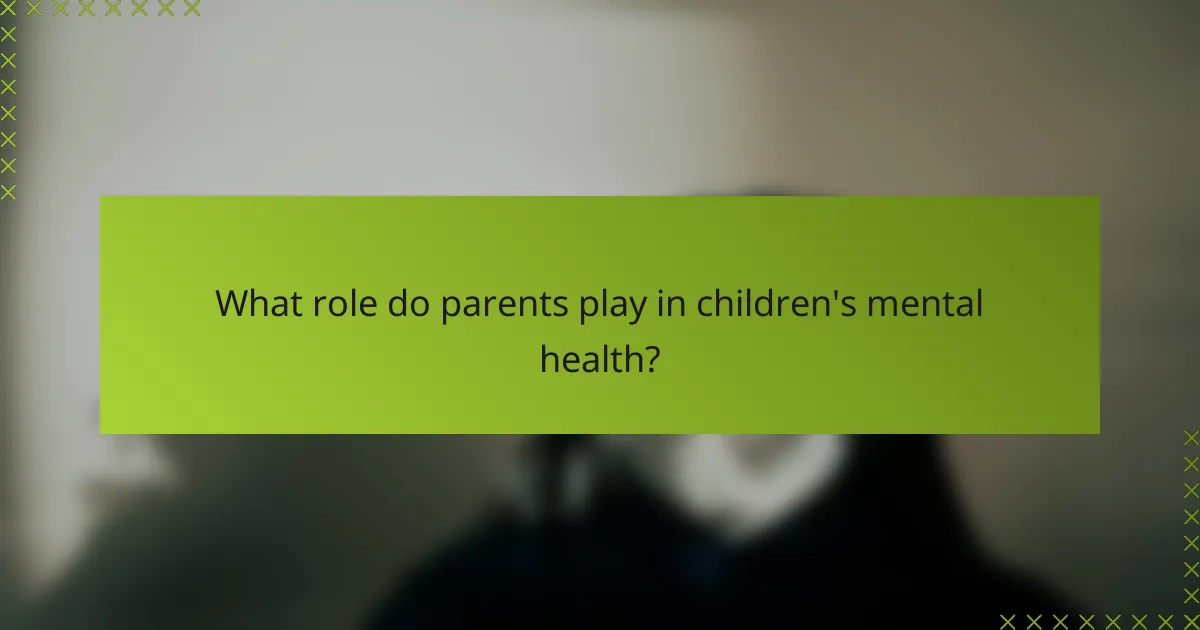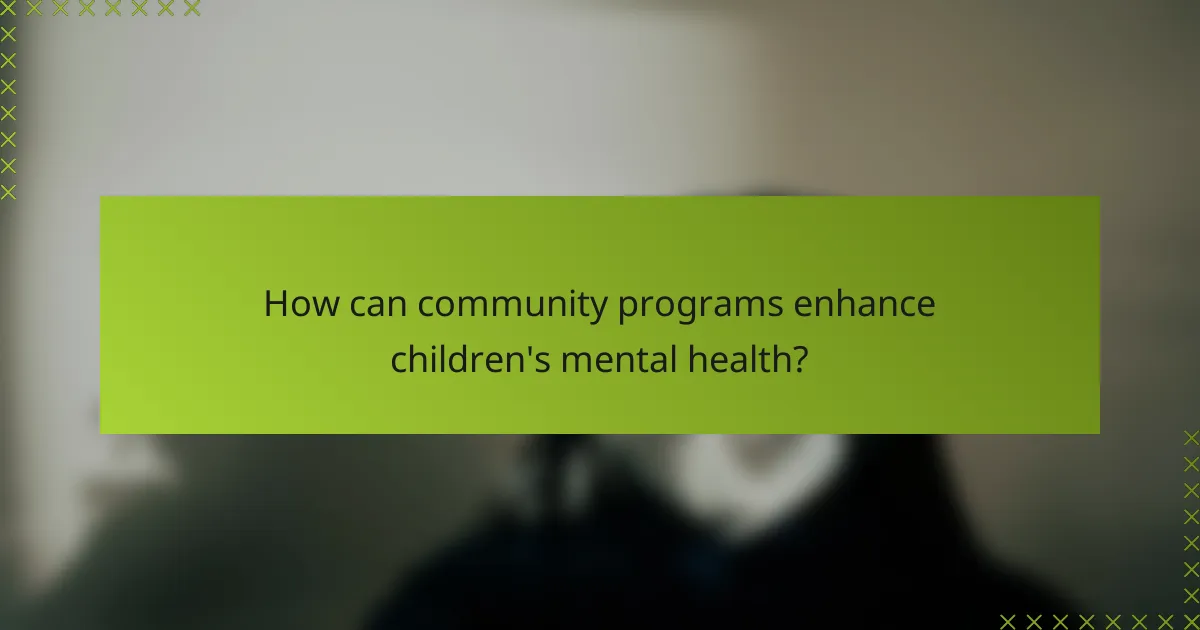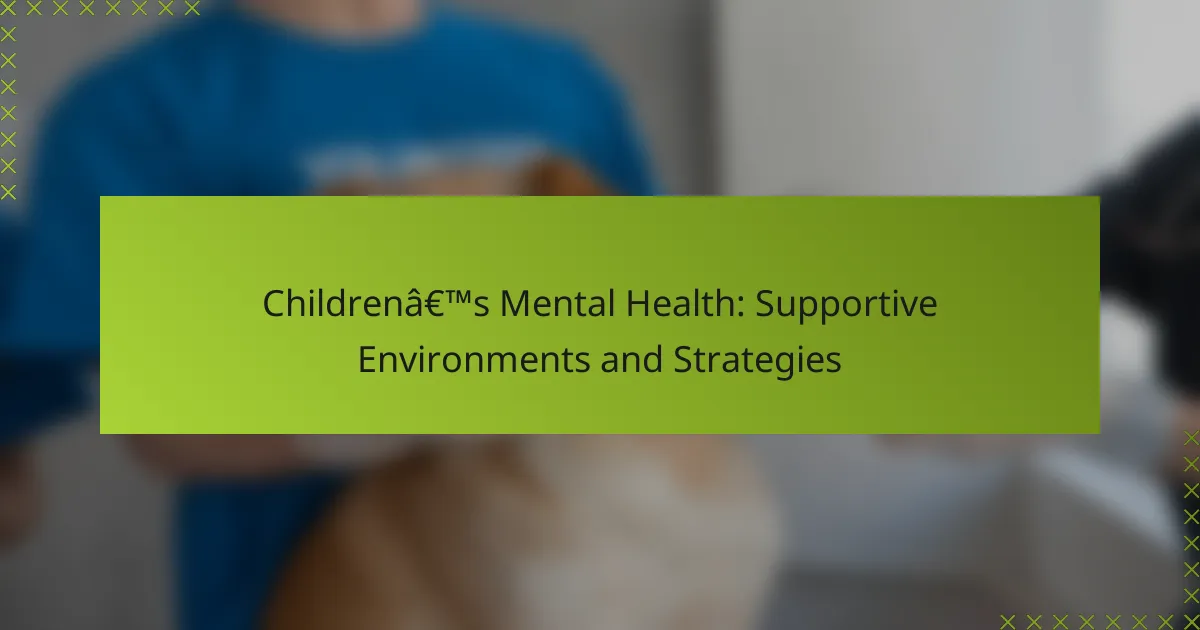Supporting children’s mental health is essential for their emotional well-being and resilience. By fostering supportive environments at home and in schools, implementing mindfulness practices, and encouraging active parental involvement, we can create a foundation for healthier development. These strategies not only enhance children’s mental health but also promote a culture of understanding and support within communities.

What are effective strategies for supporting children’s mental health in India?
Effective strategies for supporting children’s mental health in India include fostering supportive environments, implementing mindfulness practices, and encouraging parental involvement. These approaches can significantly enhance emotional well-being and resilience among children.
Mindfulness practices
Mindfulness practices help children develop awareness of their thoughts and feelings, promoting emotional regulation. Techniques such as deep breathing, meditation, and yoga can be integrated into daily routines, even in schools, to create a calming atmosphere.
For practical implementation, short sessions of 5-10 minutes can be introduced during breaks or at the start of the day. Encouraging children to focus on their breath or engage in guided imagery can enhance their coping skills.
Positive reinforcement techniques
Positive reinforcement involves recognizing and rewarding desirable behaviors, which can boost children’s self-esteem and motivation. Simple rewards, such as praise or small tokens, can encourage children to repeat positive actions.
For example, a sticker chart can track achievements in areas like homework completion or social interactions. This method fosters a supportive environment where children feel valued and understood.
Structured routines
Establishing structured routines provides children with a sense of security and predictability, which is essential for their mental health. Consistent daily schedules for activities like meals, homework, and playtime help children know what to expect.
Parents and caregivers should aim for a balance between structure and flexibility, allowing for adjustments based on the child’s needs. A visual schedule can be an effective tool for younger children to understand their daily tasks.
Parental involvement
Active parental involvement is crucial for supporting children’s mental health. Parents should engage in open communication, showing interest in their children’s feelings and experiences. This connection fosters trust and emotional safety.
Regular family activities, such as game nights or outings, can strengthen bonds and provide opportunities for children to express themselves. Parents should also educate themselves about mental health to better support their children.
Peer support programs
Peer support programs create opportunities for children to connect with their peers, share experiences, and develop social skills. These programs can be implemented in schools or community centers, offering a safe space for children to discuss their feelings.
Facilitating group activities, such as team sports or art classes, encourages collaboration and friendship. Schools can also train older students to mentor younger ones, fostering a culture of support and understanding among peers.

How can schools create supportive environments for mental health?
Schools can create supportive environments for mental health by integrating mental health education, establishing safe spaces, and training staff to recognize and respond to mental health issues. These strategies foster a culture of understanding and support, essential for student well-being.
Implementing mental health education
Integrating mental health education into the curriculum helps students understand their emotions and develop coping strategies. Schools can offer workshops, classes, or seminars that cover topics such as stress management, emotional regulation, and the importance of seeking help.
Practical examples include incorporating mental health topics into health classes or hosting guest speakers from local mental health organizations. This approach not only raises awareness but also normalizes conversations about mental health among students.
Creating safe spaces
Safe spaces within schools provide students with environments where they can express their feelings without fear of judgment. These areas can be designated rooms or zones where students can take breaks, relax, or talk to a trusted adult.
To establish these spaces, schools should consider student input on what makes them feel safe and comfortable. Regularly scheduled mindfulness or relaxation sessions in these areas can further enhance their effectiveness in supporting mental health.
Training staff in mental health awareness
Training staff to recognize signs of mental health issues equips them to respond appropriately and support students in need. Professional development programs can focus on identifying symptoms, understanding mental health resources, and effective communication techniques.
Schools should prioritize ongoing training and provide resources for staff to stay informed about mental health trends and best practices. This commitment not only benefits students but also fosters a supportive school culture where mental health is openly discussed and prioritized.

What role do parents play in children’s mental health?
Parents play a crucial role in shaping their children’s mental health by providing support, guidance, and a nurturing environment. Their involvement can significantly influence emotional development and resilience.
Open communication
Open communication is essential for fostering a healthy mental state in children. Parents should encourage their kids to express their feelings and thoughts without fear of judgment. This can be achieved by actively listening and validating their emotions.
To promote open dialogue, set aside regular time for conversations, such as during family meals or evening routines. Asking open-ended questions can help children feel more comfortable sharing their experiences.
Monitoring emotional well-being
Monitoring emotional well-being involves being attentive to changes in a child’s mood or behavior. Parents should look for signs of distress, such as withdrawal, irritability, or changes in sleep patterns. Recognizing these signs early can lead to timely support.
Establishing a routine that includes check-ins about feelings can help children articulate their emotional state. Tools like emotion charts can also assist younger children in identifying and expressing their feelings more clearly.
Encouraging social interactions
Encouraging social interactions is vital for children’s mental health, as it helps them build relationships and develop social skills. Parents can facilitate playdates, group activities, or community events to provide opportunities for their children to engage with peers.
It’s important to support children in navigating social situations, offering guidance on how to initiate conversations and resolve conflicts. Encouraging participation in team sports or clubs can also enhance their social networks and boost self-esteem.

What are the signs of mental health issues in children?
Signs of mental health issues in children can manifest in various ways, including changes in behavior, academic struggles, and withdrawal from activities. Recognizing these signs early can lead to timely support and intervention.
Changes in behavior
Behavioral changes are often the most noticeable signs of mental health issues in children. These may include increased irritability, mood swings, or sudden outbursts of anger. Parents and caregivers should be alert to any drastic shifts from a child’s typical behavior.
It’s essential to differentiate between normal developmental changes and concerning behavior. For instance, a child who becomes unusually aggressive or starts having frequent tantrums may need further evaluation.
Academic struggles
Academic difficulties can be a significant indicator of mental health concerns. Children may experience a decline in grades, lack of focus, or difficulty completing assignments. These struggles can stem from underlying emotional or psychological issues that hinder their ability to learn effectively.
Parents should monitor their child’s academic performance and consider seeking help if they notice consistent patterns of failure or disengagement. Engaging with teachers can provide additional insights into the child’s behavior in a school setting.
Withdrawal from activities
Withdrawal from previously enjoyed activities is another critical sign of potential mental health issues. A child who suddenly loses interest in sports, hobbies, or social interactions may be experiencing emotional distress. This change can indicate feelings of sadness or anxiety that need to be addressed.
Encouraging open communication about feelings can help children express their concerns. It’s important to create a supportive environment where they feel safe discussing their emotions and experiences.

How can community programs enhance children’s mental health?
Community programs can significantly improve children’s mental health by providing supportive environments and resources tailored to their needs. These initiatives foster social connections, promote emotional well-being, and offer access to mental health services, creating a holistic support system for children and their families.
Types of community programs that support mental health
Various community programs can enhance children’s mental health, including after-school activities, mental health awareness campaigns, and family support services. After-school programs often focus on skill-building and social interaction, while awareness campaigns educate families about mental health issues. Family support services provide resources and counseling, helping parents understand and address their children’s emotional needs.
Benefits of community involvement
Community involvement can lead to improved mental health outcomes for children by fostering a sense of belonging and reducing feelings of isolation. Engaging in local activities helps children build friendships and develop social skills. Additionally, community support can alleviate stress for families, creating a more nurturing environment for children to thrive.
How to create effective community programs
To create effective community programs that enhance children’s mental health, it is essential to assess local needs through surveys and focus groups. Programs should be inclusive, culturally sensitive, and accessible to all families. Collaborating with schools, healthcare providers, and local organizations can strengthen these initiatives and ensure they address the specific challenges faced by children in the community.
Challenges and considerations
While community programs can be beneficial, challenges such as funding, resource allocation, and community engagement can arise. Securing consistent funding is crucial for program sustainability, and engaging local stakeholders can help overcome barriers. It is also important to regularly evaluate program effectiveness and make adjustments based on feedback from participants and families.
